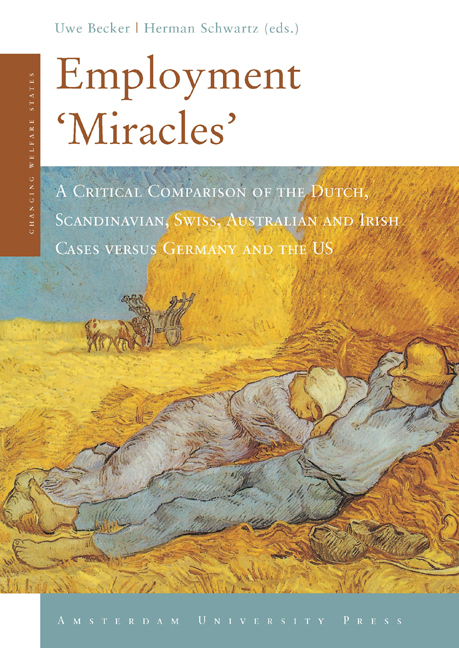 Employment 'Miracles'
Employment 'Miracles' Book contents
- Forntmatter
- Contents
- Preface
- 1 Introduction: Miracles, Mirages and Markets
- 2 The Dutch Model: Magic in a Flat Landscape?
- 3 Employment and Unemployment in Denmark and Sweden: Success or Failure for the Universal Welfare Model?
- 4 The Evolution of the Finnish Model in the 1990s: From Depression to High-Tech Boom
- 5 The Swiss Miracle: Low growth and high employment
- 6 Recasting the Story of Ireland’s Miracle: Policy, Politics or Profit?
- 7 The Australian Miracle: Luck, Pluck or Being Stuck Down Under?
- 8 Last Year’s Model? Reflections on the American Model of Employment Growth
- 9 The German Contrast. On Bad Comparisons, Special Circumstances, Luck and Policies That Turned Out to Be Wrong
- 10 Conclusion: The Importance of Lucky Circumstances, and Still the Liberal-Social Democratic Divide
- Bibliography
- Contributors
- Index
6 - Recasting the Story of Ireland’s Miracle: Policy, Politics or Profit?
Published online by Cambridge University Press: 15 January 2021
- Forntmatter
- Contents
- Preface
- 1 Introduction: Miracles, Mirages and Markets
- 2 The Dutch Model: Magic in a Flat Landscape?
- 3 Employment and Unemployment in Denmark and Sweden: Success or Failure for the Universal Welfare Model?
- 4 The Evolution of the Finnish Model in the 1990s: From Depression to High-Tech Boom
- 5 The Swiss Miracle: Low growth and high employment
- 6 Recasting the Story of Ireland’s Miracle: Policy, Politics or Profit?
- 7 The Australian Miracle: Luck, Pluck or Being Stuck Down Under?
- 8 Last Year’s Model? Reflections on the American Model of Employment Growth
- 9 The German Contrast. On Bad Comparisons, Special Circumstances, Luck and Policies That Turned Out to Be Wrong
- 10 Conclusion: The Importance of Lucky Circumstances, and Still the Liberal-Social Democratic Divide
- Bibliography
- Contributors
- Index
Summary
Only at one's peril would one underestimate the extent and pace of change occurring in Ireland. Over the space of just six years in the 1990s, the country saw phenomenal growth in jobs, output and incomes as well as significant changes in consumption, lifestyles, values and patterns of political and social organisation. Indeed, it may not be unreasonable to claim that Ireland changed as much in the last decade as in the preceding century. Gainsaying many predictions and the experience of most other countries, ‘Ireland.plc’ prospered hugely as trade and markets became more globalised and supranational political and economic blocs more established. Ireland is generally regarded as a model case of how a small European country has benefited particularly from the current stage of the globalised competitive economy. The picture which this chapter paints of Ireland is somewhat different: an economy-oriented (and within that competition-oriented), carefully managed model of national modernisation which has self-consciously built a capital-friendly economic policy, a consensus-oriented political culture and a model of society in which the ‘social’ is subservient to the economic. This piece distances itself from much of the existing literature which is quite polarised in how it interprets and explains the Irish case. Growth tends to be attributed either to economic factors (international but also national) or to political factors. Here I argue for a more complicated analysis, claiming that the story of Ireland's ‘success’ needs to be cast in terms of an interaction between policy, politics and economics. Furthermore, the attribution of ‘success’ to the Irish model in implying significant change may be premature. A more guarded interpretation is called for when one considers how recent Ireland's growth and its sustainability are. Developments in the last few years not only indicate Ireland's vulnerability to recession in the USA but also reveal endogenous challenges, in terms of the management of public finances and the likely continuation of policy consensus.
This article has three main objectives, organising it into three parts. The first is to identify the nature and scale of the changes involved in Ireland's economic fortunes in the last decade or so.
- Type
- Chapter
- Information
- Employment 'Miracles'A Critical Comparison of the Dutch, Scandinavian, Swiss, Australian and Irish Cases versus Germany and the US, pp. 133 - 156Publisher: Amsterdam University PressPrint publication year: 2005
